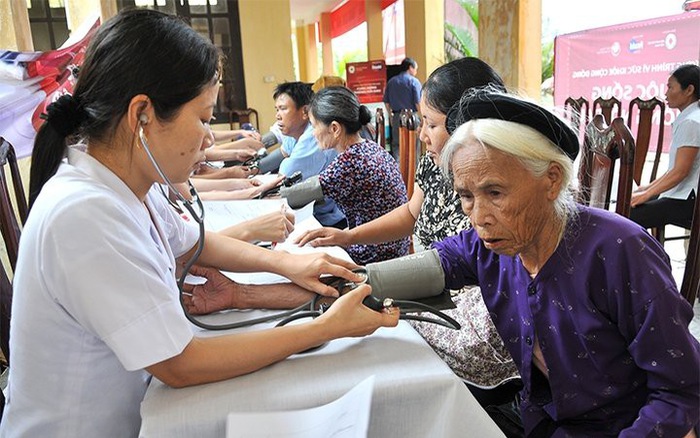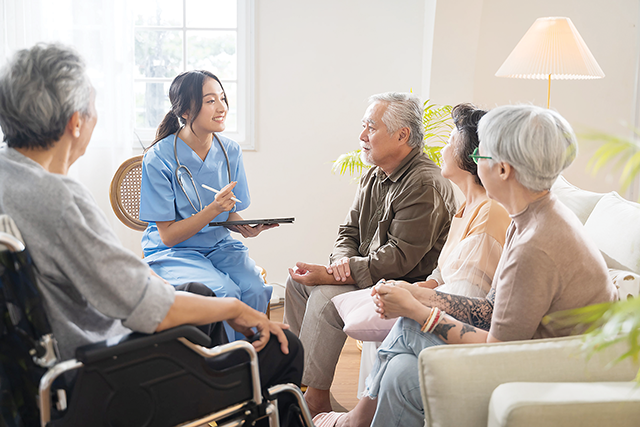Regulations on caring for the elderly's health in Vietnam
What are the regulations on caring for the elderly's health in Vietnam? - Khanh Linh (Bac Ninh)

Regulations on caring for the elderly's health in Vietnam (Internet image)
Regarding this issue, LawNet responded as follows:
1. What rights do the elderly have in Vietnam?
According to Clause 1, Article 3 of the Law on Elderly 2009, the elderly have the following rights:
- To be guaranteed with basic food, clothing, lodging, movement and healthcare needs;
- To decide to live with their children, grandchildren or to live separately at their own will;
-To be given priority in the use of services under this Law and other relevant laws:
- To be provided with conditions to participate in cultural, educational, physical training, sports, entertainment, tourist and recreation activities;
- To be provided with conditions to work in suitability to their health and professions and other conditions in order to bring into full play their role;
- To be exempt from contributions to social activities, except voluntary contributions;
- To be given priority in the receipt of relief in cash or in kind, healthcare and lodgings with a view to overcoming initial difficulties when they meet with difficulties due to consequences of natural disasters or other force majeure circumstances;
- To join in the Vietnam Elderly Association under the Association's charter;
- Other rights defined by law.
2. Regulations on caring for the elderly's health in Vietnam
2.1. Medical examination and treatment for the elderly in Vietnam
Article 12 of the Law on Elderly 2009 stipulates medical examination and treatment for the elderly as follows:
- Prioritized medical examination and treatment for the elderly shall be carried out as follows:
+ Persons aged full 80 or older shall be given priority for medical examination before other persons, except emergency patients, under-6 children and heavily disabled people;
+ Elderly inpatients are arranged proper hospital beds.
- Hospitals, except pediatrics hospitals, have the following responsibilities:
+ To organize gerontologic departments or set aside a number of beds for treatment of elderly patients:
+ To rehabilitate elderly patients' health after pernicious disease treatments at hospital and guide their further treatment and care at home;
+ To combine traditional medicine with modern medicine in treatment and guide methods of non-medicine treatment at grassroots health establishments for elderly patients:
+ The Stale encourages organizations and individuals to give free-of- charge medical examination and treatment to the elderly.
2.2. Primary healthcare at places of residence in Vietnam
Health care issues for the elderly at their places of residence are regulated as follows:
(1) Commune, ward, township health stations have the following responsibilities:
(i) To carry out propaganda and dissemination in different forms of common healthcare knowledge; guide the elderly in skills of disease prevention and treatment and self-healthcare;
(ii) To compile files for the elderly's health monitoring and management;
(iii) To give medical examination and treatment suitable to their specialization to the elderly;
(iv) To coordinate with higher-level medical establishments in organizing periodical health checkups for the elderly.
(2) Commune, ward or township health stations shall send health workers to conduct medical examination and treatment at places of residence of lonely and seriously ill elderly persons who cannot go to medical establishments for examination and treatment.
Commune, ward or township People's Committees shall support the transport of patients defined in this Clause to medical establishments at the proposal of commune, ward or township health stations.
(3) The State encourages organizations and individuals to give medical examination and treatment to the elderly at their places of residence. residence.
(4) FFunds for the implementation of tasks defined at (i), (ii), (iv) and (1) and (2) shall be provided by the state budget.
(Article 13 of the Law on Elderly 2009)
3. The State's policies towards the elderly in Vietnam
According to Article 4 of the Law on Elderly 2009, the State's policies towards the elderly include:
- To allocate appropriate annual budgets for the realization of policies to take care of and bring into full play the role of the elderly.
- To provide social patronage to the elderly under the Law on Elderly 2009 and other relevant laws.
- To incorporate policies for the elderly into policies on socio-economic development.
- To develop gerontology so as to meet the elderly's medical examination and treatment needs; to train personnel to take care of the elderly.
- To encourage and create conditions for the elderly to do physical exercises; to participate in learning, cultural and spiritual activities: to live in a safe environment and be respected in dignity; to bring into play their role in the cause of national construction and defense.
- To encourage and support agencies, organizations and individuals in carrying out propaganda on and education about the sense of respect for and gratitude to the elderly, taking care of and bringing into full play the role of the elderly.
- To commend agencies, organizations and individuals that record outstanding achievements in taking care of and bringing into full play the role of the elderly.
- To strictly handle agencies, organizations and individuals that commit acts of violating the Law on Elderly 2009 and other relevant laws.
Nguyen Thi Hoai Thuong
- Key word:
- elderly
- in Vietnam
- Cases of land rent exemption and reduction under the latest regulations in Vietnam
- Economic infrastructure and social infrastructure system in Thu Duc City, Ho Chi Minh City
- Regulations on ordination with foreign elements in religious organizations in Vietnam
- Increase land compensation prices in Vietnam from January 1, 2026
- Determination of land compensation levels for damage during land requisition process in Vietnam
- Who is permitted to purchase social housing according to latest regulations in Vietnam?
-

- Approval of the Scheme for the elderly's participation ...
- 18:58, 27/02/2025
-

- Emergency response and search and rescue organizations ...
- 10:29, 11/09/2024
-

- Handling of the acceptance results of ministerial ...
- 09:30, 11/09/2024
-

- Guidance on unexploded ordnance investigation ...
- 18:30, 09/09/2024
-

- Sources of the National database on construction ...
- 16:37, 09/09/2024
-

- Notable new policies of Vietnam effective as of ...
- 16:26, 11/04/2025
-
.Medium.png)
- Notable documents of Vietnam in the previous week ...
- 16:21, 11/04/2025
-
.Medium.png)
- Notable documents of Vietnam in the previous week ...
- 16:11, 02/04/2025
-
.Medium.png)
- Notable new policies of Vietnam to be effective ...
- 16:04, 02/04/2025
-
.Medium.png)
- Notable new policies of Vietnam effective from ...
- 14:51, 21/03/2025
 Article table of contents
Article table of contents
